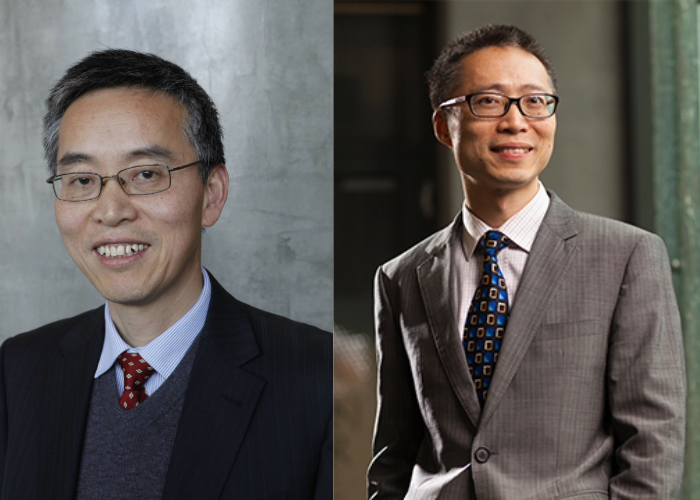Swinburne to advance battery life and EV cybersecurity with Australian Research Council grants

In summary
Swinburne has secured two grants from Australian Research Councils to advance research in energy storage and cybersecurity
Led by Professor Weixiang Shen, one project aims to enhance energy storage performance by developing new strategies to slow battery aging within each cell
The second project, led by Professor Yang Xiang, aims to address cybersecurity challenges in electric vehicle charging stations.
Swinburne University of Technology has received funding in the latest round of Australian Research Council (ARC)’s Linkage Projects 2024. The Linkage Projects scheme, part of the ARC’s National Competitive Grants Program, funds research that delivers practical benefits and strengthens Australia’s innovation and industry capabilities.
Swinburne researchers have been awarded close to $920,000 to advance two projects for battery life and EV cybersecurity, securing a portion of over $46 million shared across 75 new projects.
Swinburne’s Deputy Vice Chancellor Research, Professor Karen Hapgood, said she is proud Swinburne is leading research that addresses real world challenges in energy and cybersecurity.
“These projects demonstrate how our researchers are partnering with industry to deliver practical solutions, from extending the life of battery systems to securing Australia’s electric vehicle infrastructure. It’s a powerful example of how university research is driving innovation and supporting a more sustainable, technologically advanced future.”
Digital twins to revolutionise grid storage systems
A project led by Professor Weixiang Shen has received $449,882 to extend the lifetime of battery energy storage systems for power grids.
“This project will enable my team to develop an innovative control strategy to actively manage the operating conditions of an individual battery cell using digital twin technology. It offers an excellent opportunity to implement and validate our approach in inverter-less battery energy storage systems provided by our industry partner, which uniquely enables cell-level control within the system,” said Professor Weixiang Shen.
“The project’s outcomes will strengthen Australia’s leadership in advanced energy storage technologies, support the growth of the domestic manufacturing sector, and contribute to the creation of high-skilled jobs.”
Aiming to enhance energy storage performance, this three-year project will develop new strategies to slow battery ageing within each cell. The project will use digital twin technology, combining deep learning and electrochemical modelling, to predict the impact of operating conditions on battery ageing and regulate these conditions to control the ageing process and extend battery life. This project will support Australia's transition to sustainable energy by delivering longer battery life and reduced downtime so that battery systems can produce more over time.
The team is working in partnership with Relectrify Pty Ltd. The project team includes Associate Professor Rosalie Hocking, Dr Xiaohua Ge, Dr Peter Mahon, Dr Zhe Zhang, Mr Kristian James Guinto and Mr Bowen Zhang.
Advancing cybersecurity for safer EV charging
A project led by Professor Yang Xiang has received $474,531 to address cybersecurity challenges in electric vehicle charging stations.
“This grant will allow my team to build advanced cybersecurity tools that address the challenges posed by the interaction between EV charging stations, diverse EVs, the national power grid, and wireless communication protocols,” Professor Yang Xiang said.
“It creates a unique opportunity to generate novel research insights, validate solutions in real-world settings, and produce tools with strong commercialisation potential. Its outcomes support sustainable economic growth by enabling the safe uptake of EVs, reducing emissions, and creating jobs.”
Electric vehicle charging stations are widely deployed today, but they face significant and complex security risks due to the diversity of electric vehicles, their connection to the power grid, and wireless communication with users. This three-year project aims to address these challenges by innovative functionality-guided, update-guided, and greybox-guided fuzzing techniques.
The project will explore innovative methods for testing charging stations and developing advanced tools to secure EV infrastructure and improve cybersecurity within Australia’s expanding sustainable transport sector.
The team is working in partnership with T-POWER Pty Ltd. The project team includes Associate Professor Sheng Wen, Dr Xiaogang Zhu and Dr Lihong Tang.
-
Media Enquiries
Related articles
-

- Science
If quantum computing is answering unknowable questions, how do we know they’re right?
A new Swinburne study is tackling the paradox - if quantum computing is answering unknowable questions, how do we know they’re right?
Tuesday 16 September 2025 -

- Health
World-first disease progression model offers new hope for muscular dystrophy patients
Patients with a common type of muscular dystrophy will benefit from a world-first AI powered disease progression model with ‘life-changing’ implications, using advanced MRI imaging at Swinburne University of Technology.
Friday 05 September 2025 -

- Technology
World first study of young adults’ brain activity shows TV and gaming boosts focus, while social media hinders it
A world-first Swinburne-led study into young adults’ brain activity has found that TV and gaming are associated with increased focus, while social media is associated with decreased focus.
Thursday 07 August 2025 -

- Design
Why some clothes shrink in the wash — and how to 'unshrink' them
When your favourite dress or shirt shrinks in the wash, it can be devastating, especially if you followed the instructions closely. Unfortunately, some fabrics just seem to be more prone to shrinking than others – but why?
Tuesday 05 August 2025 -

- University
- Engineering
Distinguished Professor Hao Wang joins Swinburne
Professor Wang is a world leader in composite materials with more than 30 years of experience in composites, plastic recycling, low-carbon concrete, and turning CO₂ into useful materials
Friday 01 August 2025

